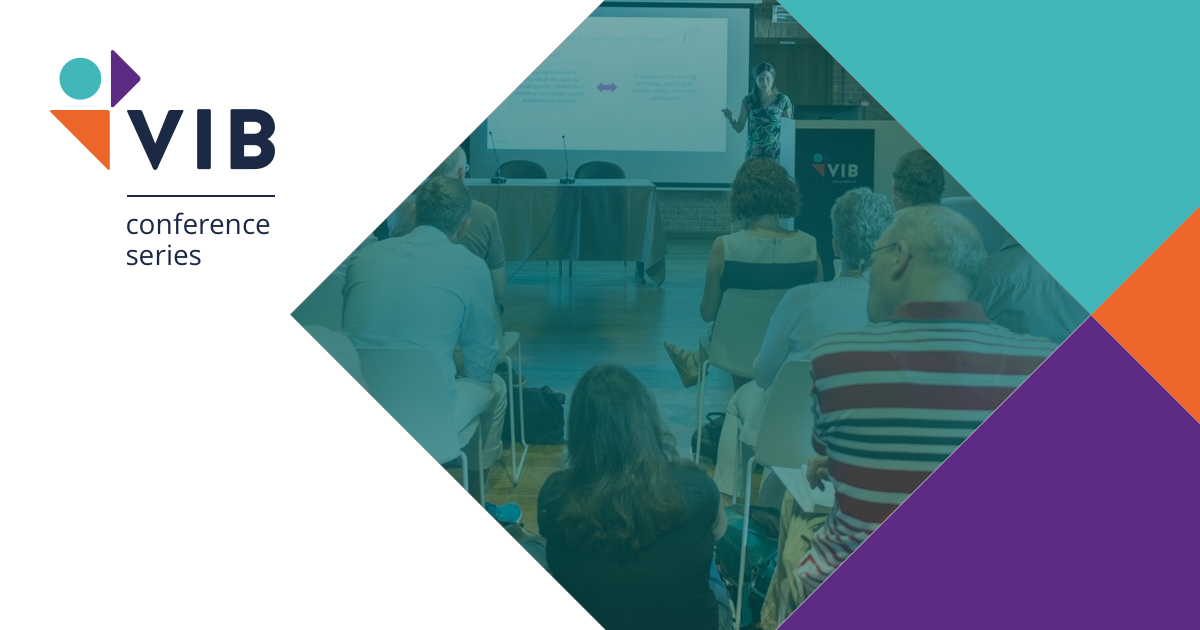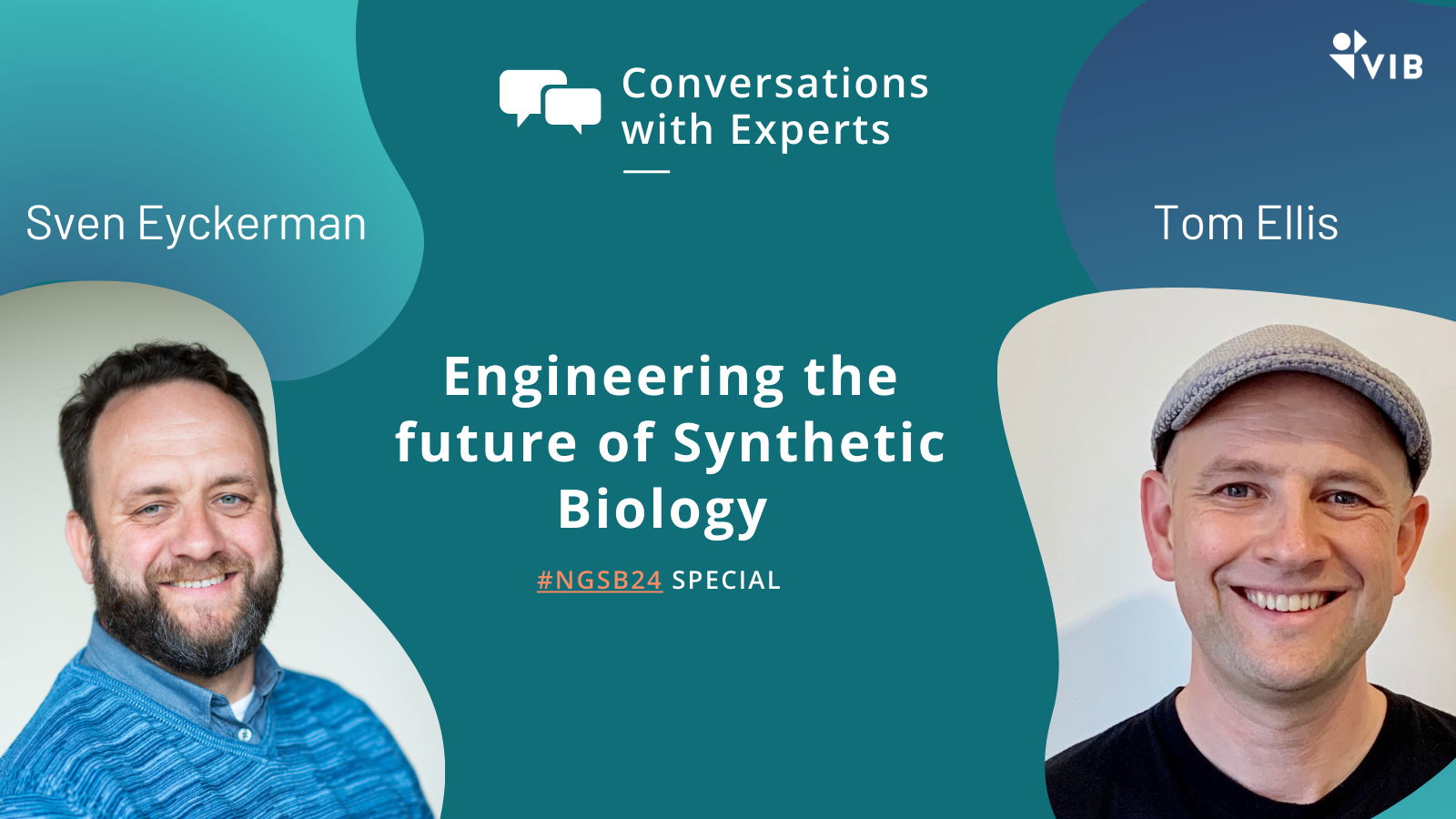Conversations with experts: engineering the future of Synthetic Biology
On the 10th and 11th of December, the 5th edition of the Next-Generation Synthetic Biology Conference will take place in Ghent, Belgium. Earlier editions of this conference had a strong focus on Genome Engineering, while the upcoming conference will put the spotlight on Synthetic Biology. In this double interview with Prof. Tom Ellis (Imperial College London) and Prof. Sven Eyckerman (VIB-UGent Center for Medical Biotechnology), two members of the organizing committee, we deep dive into the world of Synthetic Biology, present research, and future perspectives.
Hello Tom and Sven. Thank you for taking the time to do this interview. Before talking about your current research, could you give our readers a bit more information on your career paths leading up to your current role? Where did your love for science start, and how did it evolve over the years?
Tom: I grew up in a family of scientists, so I suppose I was always destined to be interested in science. While searching for my first job as a teenager, I was fortunate to be surrounded by several bio-labs in Cambridge (UK). I ended up with weekend jobs loading DNA gels for the Human Genome Project (laughs). I think that experience planted the seed. From then on, I became fascinated with DNA—understanding it and learning how to engineer it. From there, it was a pretty direct path to becoming a synthetic biology researcher and professor.
Sven: I didn’t grow up in a family of scientists (laughs). My parents were actually in the garden machinery business. But I’ve always been intrigued by engineering and the idea of building things from scratch, and biology also fascinated me. For some reason, I’ve always felt a connection between engineering and biology. For a high school project, I visited a company in garden development and landscaping. They had a small lab where they were engineering bamboo and trying to optimize it for local garden use. They succeeded—now it’s a bit of a pest because people have problems getting rid of it again (laughs). That experience in high school inspired me to study biology and biotechnology. Eventually, I worked in a lab focused on protein-protein interactions in human cells, which led me to biochemistry, cell biology, and research on protein interactions.
What is your current research focus? What exciting research projects are you working on?
Tom: My group focuses on synthetic biology in two main areas. First, we engineer microbes to produce materials. Some microbes are naturally good at producing carbohydrate and protein materials, and with synthetic biology, we can control what materials they produce, in what combinations, and when and where they do it. This allows us to create communities of engineered microbes that can grow more complex materials on demand, with applications across many sectors. Second, we work at the chromosome and genome levels. Instead of just linking genes to create new functions, we aim to construct entire chromosomes or genomes. This gives us much finer control over the organisms we engineer and produce.
Sven: My research group is more focused on understanding how cells are organized at the molecular level, and we do a lot of cell engineering to support this. So, we're basically using synthetic biology tools to advance our research.
The first edition of this conference was called “Genome Engineering and Synthetic Biology”. What made the organizing committee focus the upcoming conference more on Synthetic Biology? And how do you see this conference evolve further in the future?
Sven: The first edition of our conference in 2013 primarily focused on genome engineering. Around that time, CRISPR/Cas technology was emerging as a revolutionary tool, and we wanted to ensure VIB scientists had access to these powerful, disruptive technologies. Back then, we were one of the few genome engineering conferences in Europe. As time went on, these tools became more mainstream, and genome engineering conferences started popping up worldwide. Now, we feel a growing need for conferences dedicated to synthetic biology. The field is becoming increasingly impactful in science, so for us, this shift in focus felt like a natural evolution.
Tom: The conference we’re organizing now is the next logical step in that evolution. We’ve titled it "Next-generation Synthetic Biology" because we want to move beyond the typical synthetic biology conferences. If you look at our speaker lineup, it truly represents the next generation of researchers. We’ve invited individuals who have made a name for themselves in synthetic biology over the past few years. As the conference evolves, we want to keep this "next-generation" theme alive.

What roles do conferences play in emerging scientific fields like Synthetic Biology? What benefits can scientists gain by attending?
Sven: The VIB conference program is especially valuable for local scientists—those within VIB, as well as in Flanders, Belgium, and neighboring countries—because it gives them access to the latest developments early on. The organizing committees always strive to introduce fresh ideas and expose scientists to new concepts. And I have to say, based on the conferences VIB has organized so far, this approach has been very successful.
Tom: I think conferences like this will really attract young researchers in synthetic biology, especially PhD students and Postdocs. It allows them to present their work to others in their field and build a professional network. What’s also exciting is the diversity of topics in synthetic biology that we’ll be covering. We’ll be showcasing a wide range of research, which is important because it allows people to see all the possibilities in the field. Many other conferences tend to focus on just one specific area, but because this one spans multiple application areas, we hope it will broaden attendees’ horizons.
Computer learning and AI are other emerging fields that are becoming more prominent in scientific research. How do you see the role of AI in future Synthetic Biology research?
Tom: AI is going to become important in every aspect of life, but I think it will be particularly useful in synthetic biology, especially for predicting and designing protein and DNA sequences. AI has shown remarkable ability in understanding languages—learning grammar and meaning from text without formal instruction. It figures out how languages are structured and what words mean. This is exactly what we aim to do in synthetic biology: to write in the language of DNA as fluently as possible. So, it makes sense that AI can assist us because, ultimately, DNA is nature's programming language.
Sven: I completely agree. Protein and DNA design will be revolutionized by AI. One practical application we’ll see soon is in designing binders, like antibodies, for every protein we find in cells. This means that for any organism, like a specific plant or insect, we’ll be able to design antibodies that bind to a specific protein, allowing us to study these organisms more closely. This will significantly accelerate advancements in biology, and will also provide new opportunities for synthetic biology. This really demonstrates just how crucial AI will be in protein design.
With the rise of synthetic biology, ethical questions also intensify: scientists ‘playing God’, synthetic life forms unintentionally damaging ecosystems, the misuse of synthetic biology to create biological weapons, and so on. How do you, as scientists, look at these ethical concerns?
Tom: I believe we must take people’s concerns seriously and consider them in our research management. However, the majority of our work doesn’t lead to anything potentially dangerous or ethically questionable. We mostly work with safe organisms in the lab, many of which are already used in food production and consumed regularly. The genetic engineering we do doesn’t give these organisms any new "superpowers." In fact, we often modify them to perform a very specific task under niche lab conditions. Outside of these controlled environments, they would likely struggle and be out-competed by natural organisms.
Sven: I think people sometimes underestimate the complexity of nature. Nature has spent millions of years evolving and optimizing itself. As Tom said, we often engineer organisms to do one thing really well in controlled lab settings, but they wouldn’t perform as effectively in natural ecosystems. I want to tread carefully when discussing things like biological weapons, but the truth is that creating something like that in a lab is extremely difficult.
Tom: Agreed—nature has already evolved plenty of scary things (laughs).
Sven: Exactly! Even highly specialized scientists can’t easily design something more dangerous than what already exists in nature. But that brings me back to AI, as it may be able to integrate the enormous complexity of pathogens. It is thus crucial that we establish the right safeguards around the vast amounts of biological data we're generating. These discussions are already happening within the scientific community and in companies creating AI models.
Tom: I’d also like to touch on the idea of “playing god.” It really depends on how you define that. For me, even having a puppy is a form of playing god. You control the life of a pet, which isn’t a part of a natural ecosystem. In some ways, I find that more extreme than what we do—engineering a microbe to perform a task for a limited time. It’s a challenging ethical question, but it’s an interesting conversation to have.
Very appealing research to the imagination is the Space Synthetic Biology Project (Synbio) by NASA, in which they genetically engineered baker’s yeast to produce specific antioxidants during space missions. For my final question, I would like to stay closer to Earth. What will be the most exciting advancements for society that synthetic biology could provide us with in the near future?
Sven: Humanity is facing enormous ecological and environmental challenges, and I believe some solutions lie in what people often refer to as the next industrial revolution—the bio-based industry. Synthetic biology will play a key role in producing everyday products. Bacteria, yeasts, and fungi will be used to manufacture fabrics, construction materials, and pigments for paints. I mention these specific examples because some "early adopter" companies will be attending our conference to talk about these concepts.
Tom: I think most people don’t realize how much genetically engineered microbes are already involved in producing everyday products, especially in the food industry. For example, the enzymes used to make cheese are often produced by engineered microbes—it has become pretty standard. We’re also seeing more products wrapped in bioplastics, another result of innovations in synthetic biology. Looking ahead, I expect that many new products will be food-related. A major area of development is creating better alternatives to meat. We’re hoping to see tastier, more nutritious products on the market that don’t require the large-scale farming of cattle. In addition, materials and ingredients in cosmetics and medicine will increasingly come from engineered microbes. Beyond microbes, I believe engineered human cells will play a crucial role in treating diseases, especially cancers. Synthetic biology is making immunotherapy more precise, safer, and more affordable.
Thank you very much for your time. We are looking forward to seeing you at the conference.

Steve Bers





